September 1945: Gouzenko Affair
On Sept. 5, 1945, just after the end of the Second World War, a Russian cipher clerk named Igor Gouzenko (pictured left) fled the Soviet Embassy in Ottawa with 109 documents proving the existence of a Soviet spy ring in Canada. His revelations reverberated throughout the world and helped to ignite the Cold War. Some of those revelations reported that results of atomic bomb research might have been leaked to the Kremlin. The Government of Canada immediately placed Gouzenko and his family under protection and Prime Minister Mackenzie King told his British and American allies of the situation. All three leaders, Prime Ministers King and Attlee and U.S. President Truman, decided to keep the affair secret until real evidence was found. The Gouzenko Affair that revealed the existence of a Soviet spy ring in Canada is an event of national historic significance. For Canadians, it marked the beginning of the Cold War and an awakening of anti-Communist sentiment.
Indeed, it made Canada, as well as other nations, recognize the changing relationship with the USSR and the chilling of the world's political climate. The Gouzenko Affair sparked legal proceedings and a Royal Commission in Canada, becoming a milestone in the debate on State security and civil liberties; in the long term, it resulted in the reorganization of the national security system.
Canada has been an active and committed participant in the United Nations since its founding in 1945 in San Francisco, where Canada played a key role in the drafting of the Charter. Individual Canadians have played vital roles within the United Nations, and many of the Organization's great accomplishments have had a Canadian part. For example, fifty years ago John Humphrey was the main author of the Universal Declaration of Human Rights; Lester Pearson helped to...


